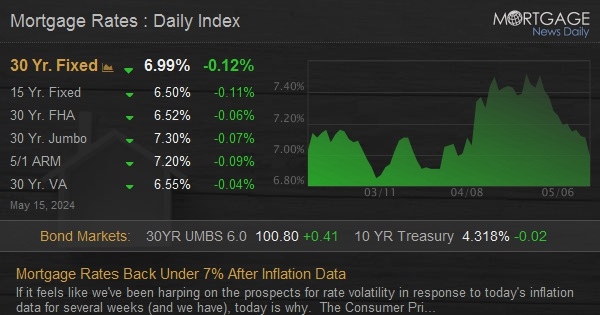If it feels like we’ve been harping on the prospects for rate volatility in response to today’s inflation data for several weeks (and we have), today is why. The Consumer Price Index (CPI) is the biggest reliable source of momentum for interest rates when it comes to scheduled data–big enough that the results can come in right in line with forecasts and still have a big impact.
Indeed, today’s results were right in line with forecasts. In month over month terms, core inflation was 0.3% and annual inflation was 3.6%. The Fed wants those numbers at 0.1-0.2 in monthly terms and 2.0% annually in order to be more confident about rate cuts. The annual number wouldn’t need to hit 2.0% as long as monthly numbers suggested we were well on our way.
And again, today’s monthly number only suggested 3.6% (0.3 x 12). Despite being almost twice as brisk as desired, the 0.3% rate of monthly core inflation was apparently a relief for bond traders who quickly began pushing rates lower. Mortgage rates are based on mortgage-specific bonds that correlate substantially with US Treasuries.
Other economic data helped the cause with Retail Sales coming in unchanged for April versus forecasts calling for a 0.4% increase. Taken together, the as-expected inflation data and weaker retail sales suggest cooler inflation pressure relative to Q1’s data–something all fans of low rates were hoping to see.
Mortgage Lenders were able to drop their average top tier conventional 30yr fixed rate to 6.99% from 7.11% yesterday.
Source link
#Mortgage #Rates #Inflation #Data




